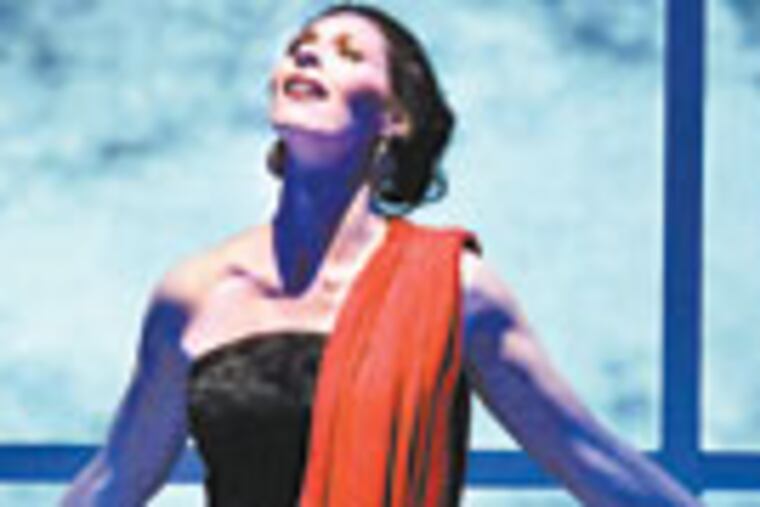Phaedra's wild ride
Hans Werner Henze's opera about that hot stepmom/stepson action is sophisticated and engrossing in its OCP American premiere.

For all its bizarre plot twists, spare, distilled music, and floods of symbolic computer-animated imagery, the newish Hans Werner Henze opera Phaedra is a crowd pleaser - of a distinctly Germanic sort.
The kind of tawdriness that makes Americans acutely uncomfortable often leaves Europeans exhilarated. So even if Philadelphians cry "Eew!" when the opera's title character tries to seduce her stepson by offering to roll him a cigarette between her thighs, Phaedra - in its U.S. premiere by Opera Company of Philadelphia - is also full of voice-flattering vocal lines and a stimulating succession of dramatic events open to such wide interpretation that the ultimate meaning lies in the intellect of the beholder.
So regardless of whether one likes the opera, it's seriously engrossing. You want to hear it again, particularly since Friday's opening-night tentativeness is likely to evaporate later in the run.
Both technologically and conceptually, the production is among OCP's most sophisticated. The Kimmel Center's Perelman Theater is outfitted with panels in near constant motion both physically and in the video images they carry, beginning with squares within squares suggesting the first scene's impenetrable labyrinth. Later, the squares morph into any number of stage settings, sometimes using representational shadowplay but often maintaining atmospheric abstraction - appropriate to a plot whose distressed stepmother and stepson are, in fact, playthings of gods who are jealous, protective, and quite unimaginable.
Musically, the 2007 opera is among Henze's best. Though his operas have little family resemblance, this one has none of the clotted textures of the late-1980s Das verratene Meer and maintains the clarity of his 2002 Symphony No. 10 with a spare, airy manner that's so concise that every note seems to do triple duty.
The opera's only clear antecedent is Benjamin Britten's similarly spare 1975 cantata Phaedra, which, like Henze's, is usually willing to go wherever the story leads. Though often atonal, Henze's brand of it in Phaedra seems to come from a force and range of expression that can't be fettered by anything traditional. Percussion is Kabuki-esque. Instrumental writing often feels like a series of explosive cadenzas. It's wild - even if the orchestra under music director Corrado Rovaris plays with some cautious reserve.
Act 2 - written after Henze emerged from a two-month coma - is a bit mad. The dead are resurrected for purely poetic reasons without the inner logic of, say, modern science fiction. It's like Hugo von Hofmannsthal's libretto to Die Frau ohne Schatten, with allegorical characters relating to one another more like figures in a neoclassical panoramic painting than in linear theater. So yes, the theatrical momentum breaks down as the opera goes on, but the composer was obviously having a ball, writing a percussion interlude, a comic scene with the goddess Artemis rounding up stray body parts, and, more seriously, soliloquies when characters find themselves less-than-happily reanimated and aren't sure who they are.
Wisely, designer Philippe Amand and stage director Robert Driver aren't about to weigh down the proceedings with clarifications or explanations. Just fasten your seat belt and take the ride - with some computer-created sound effects.
No matter that the role of Artemis, goddess of the hunt and animals, is supposed to be female. Written for a countertenor (and sung here by Anthony Roth Costanzo), the role sounds female but the body is male with a partly bare chest to prove it. I've heard Costanzo under more vocally comfortable circumstances, though he's about the only cast member who seems taxed by the opera.
As Phaedra, Tamara Mumford successfully inhabits one of the great theatrical characters without sacrificing depth of tone in her mezzo-soprano voice. Her object of desire (stepson Hippolyt) is William Burden, his boyish upper-range extension put to good use in one of his most successful vocal characterizations. Elizabeth Reiter (Aphrodite) and Jeremy Milner (Minotauros) round out one of the most consistently well-cast operas in recent seasons.
Phaedra
Music by Hans Werner Henze; libretto by Christian Lehnert. Conducted by Corrado Rovaris, stage directed by Robert B. Driver, designed by Philippe Amand. Costumes by Richard St. Clair.
Cast:
Tamara Mumford. . . Phaedra
William Burden. . . Hippolyt
Anthony Roth Costanzo . . . Artemis
Elizabeth Reiter. . . Aphrodite
Jeremy Milner. . . Minotauros
June 8, 10 and 12 at the Kimmel Center's Perelman Theater. Information: www.operaphila.org
or 215-893-1999. EndText